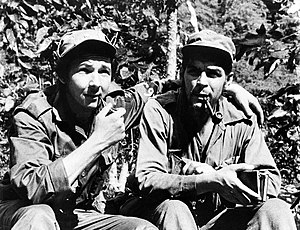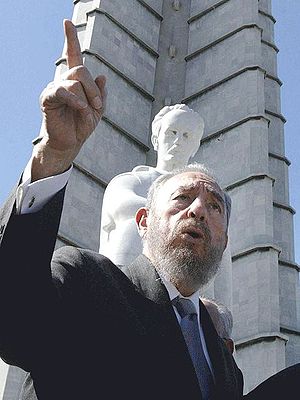 Image via WikipediaCUBA DEVALUES DOLLAR
Image via WikipediaCUBA DEVALUES DOLLAR Havana Cuba.
Cuba has devalued Cuba's currency two types of peso by about 8 per cent to equal the dollar and other foreign monies, hoping the currency devaluation will spur exports and local production as the government seeks to overhaul a moribund economy.
The announcement published in Cuba state newspapers says the hard-currency peso used mostly by tourists and foreign companies on the island will now be worth 62p, down from 67p. Each hard-currency peso is still worth 24 of the standard pesos with which most Cubans are paid in an unusual two-tiered currency system.
The move could be a boon for the island's crucial tourism industry by making trips more affordable and encourage more private investment. It will also increase the peso value of remittances sent from abroad, a key lifeline for many cash-strapped Cubans working for salaries of about £12 a month.
But it will also make foreign goods priced in dollars or other hard currencies more expensive for most Cubans. This, according to officials will encourage more local production, especially in the food sector.
Andrew Macdonald, CEO of Esencia Group, a British company that has been developing tourism and the renewable energy sector in Cuba for the last seven years, said: "this provides another competitive edge for the Cuban economy, making it an even more attractive tourist destination and making their exports better value".
The move coincides with Cuba embarking on a series of economic reforms aimed at opening up the country to more foreign investment and boosting private sector activity that had been strictly limited under communist rule.
A Communist Party congress in April is expected to endorse the wide-ranging reform plan proposed by President Raul Castro.
The reforms seek to have former state workers absorbed by the private sector, for state subsidies to be cut, for urban cooperatives to spring up, the welcoming of foreign capital, and for companies to operate autonomously.
The statement said that the country's economic woes, exacerbated by the effects of three monster hurricanes that struck in 2008 and the global financial crisis, had forced the bank to maintain an exchange rate that "did not correspond to the country's current economic conditions."
The bank said that despite Cuba's economic woes, the government had managed to resume payments to foreign companies that had seen their payments blocked and accounts frozen the year before.
It also said the country had managed to renegotiate its foreign debt, though it gave no details. Cuba does not release statistics on foreign debt.
One of the long-term goals of the Cuban government has been to eliminate the two-tiered currency system.
Cuban embargo needs to be terminated in Cuba within a few years so we could see up to 20 million tourists
a year vacationing in Cuba beaches.However there would not be enough hotel rooms to accomodate the tourist. This boom in tourism would certainly bring up the standard of living of the people and improve their civil, political and economic conditions. Notwithstanding the past views of the exile community, perhaps, the so called embargo has been quite counterproductive and in fact, the embargo has helped the support, agony and repression within Cuba of its people for over 50 years. Cuba has five Uranium mines with radiation contamination and no-one seems to care. Cuba has sold uranium to Iran and North Korea and no-one seems to take notice. Openning Cuba to the world and opening the world to Cuba would surely decontaminate othe atmosphere from non-sense and bring sanity and prosperity to the Cuban People.
Cuba's future looks bright as relations betweeen Cuba and the US government seem to be heading in the right direction.
http://Calls2Cuba.com

 Cuban Mansions for Rent
Cuban Mansions for Rent
